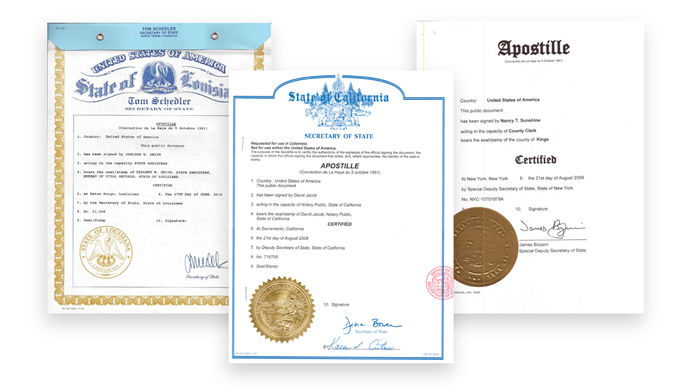Apostille Providers Houston TX: Ensuring Paper Authentication
Exploring the Reasons Behind the Required Need of Apostille Qualification for Legal Documents
In the world of lawful paperwork, the compulsory need of apostille qualification has actually come to be an essential aspect that considerably affects the legitimacy and acknowledgment of legal papers on an international scale. Recognizing the reasoning behind this need includes diving into the intricate internet of legal complexities, historical precedents, and international arrangements that highlight the significance of apostille certification in today's interconnected globe. By checking out the underlying reasons behind this prevalent demand, a clearer image emerges of why this seemingly governmental process holds such tremendous relevance for governments, people, and organizations alike.
Historic Development of Apostille Certification
Exactly how did the concept of apostille accreditation evolve gradually to become an important part of global file recognition? The historical development of apostille qualification go back to the very early 20th century. The need for a simplified approach of verifying papers for usage throughout borders emerged as global profession and travel boosted. In reaction to this demand, the Hague Meeting on Personal International Legislation presented the Apostille Convention in 1961. This global treaty developed a structured procedure for accrediting the credibility of records to be recognized in member nations.
Originally adopted by a couple of European countries, the Apostille Convention slowly got global approval due to its performance and performance in verifying the legitimacy of official documents. For many years, the convention's reach expanded as more countries signed up with, identifying the apostille as a globally approved kind of paper verification. Today, apostille certification has become a conventional need for confirming lawful documents in worldwide deals, guaranteeing smooth interaction and legal procedures between nations.
Simplifying International Document Legalization
The streamlining of global document legalisation procedures has considerably boosted efficiency in cross-border transactions. Streamlining the procedure of legislating files for global usage has actually ended up being vital in helping with swift and smooth transactions in between nations. Among the key devices that have actually added to this simplification is the adoption of the Apostille Convention, which offers a standard approach for verifying the authenticity of files across participating nations.
By adhering to the Apostille demands, nations accept recognize each other's public records as valid without the demand for additional legalisation. This eliminates the prolonged and often cumbersome process of numerous verifications by different authorities, conserving time and sources for individuals and services participated in global tasks.

Ensuring File Credibility and Legitimacy
To guarantee the authenticity and validity of lawful documents in global purchases, stringent verification procedures are essential. By calling for apostille accreditation for legal papers, authorities aim to authenticate the origin of papers and confirm the signatures of individuals involved.
Additionally, confirming the authenticity of legal records via apostille accreditation improves count on and self-confidence amongst celebrations involving in worldwide deals. Eventually, by promoting rigorous verification criteria, apostille qualification contributes to a much more clear and secure international legal structure.

Assisting In Cross-Border Legal Acknowledgment
In the world of international transactions, the apostille certification not only ensures the authenticity and legitimacy of lawful documents but also plays a pivotal function in promoting cross-border lawful acknowledgment (Houston Apostille). When legal papers bear an apostille certification, they are readily approved by international authorities without the need for more confirmation. This streamlined procedure speeds up the acknowledgment of papers in different countries, advertising efficiency and decreasing administrative obstacles in legal issues that transcend nationwide boundaries
Assisting in cross-border legal acknowledgment with apostille accreditation fosters count on and confidence in the authenticity of records traded in between countries. This recognition is specifically crucial in circumstances such Bonuses as worldwide organization transactions, fostering procedures, or lawful process involving celebrations from various territories. By adhering to the standards set forth by the Apostille Convention, her explanation countries agree to honor the apostille seals attached to files from other member countries, hence streamlining the procedure of legal recognition across borders. Ultimately, the apostille certification serves as a basic device in advertising seamless global lawful cooperation and guaranteeing the smooth procedure of cross-border transactions.
Conformity With International Treaty Criteria
Compliance with worldwide treaty standards is critical for making certain the uniform application of legal policies across participating nations. The Apostille Convention, established in 1961, describes the demands for the approval of public papers amongst member nations. By adhering to the requirements established forth in this treaty, nations devote to identifying the credibility of each various other's certification without the need for more verification - Houston Apostille. This shared acceptance streamlines the process of cross-border file acknowledgment, promoting effectiveness and reducing bureaucratic difficulties.
The Apostille qualification, as mandated by the treaty, functions as an assurance of credibility for papers such as birth certifications, marital relationship licenses, court judgments, and notarized actions. This standardized strategy assists stop fraud and guarantees that lawful papers stemming from one member country are conveniently accepted in an additional. By complying with worldwide treaty standards, nations demonstrate their commitment to upholding the concepts of transparency, count on, and collaboration in legal matters on a global scale.
Verdict

In the world of lawful documents, the compulsory requirement of apostille qualification has ended up being a vital element that dramatically affects the credibility and acknowledgment of legal documents on an international scale. Today, apostille qualification has ended up being a conventional requirement for confirming legal documents in worldwide transactions, making sure smooth communication and lawful process between countries.
Moreover, verifying the credibility of legal records via apostille qualification enhances depend on and self-confidence amongst celebrations engaging in worldwide purchases.In the realm of global purchases, the apostille accreditation not just guarantees the authenticity and credibility of lawful papers but additionally plays an essential function in facilitating cross-border legal recognition. By adhering to the standards established forth by the Apostille Convention, countries agree to honor the apostille seals attached to documents from other member nations, therefore simplifying the procedure of lawful acknowledgment across borders.